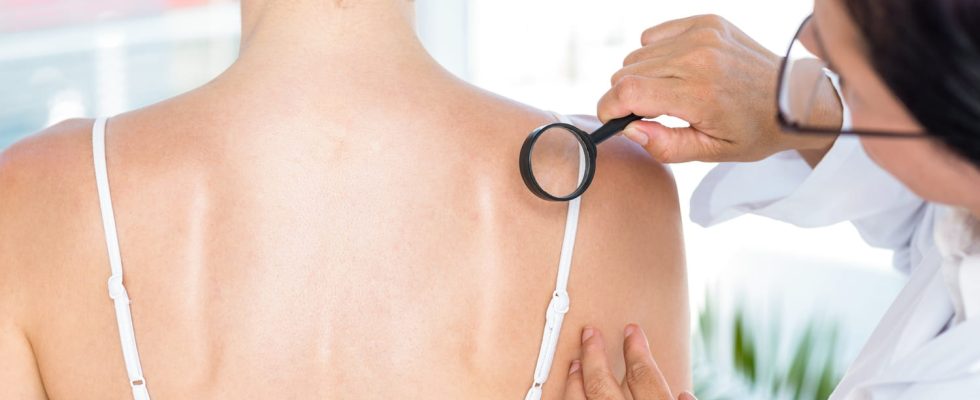The dermatologist is the doctor who specializes in skin diseases (warts, moles, psoriasis, eczema, etc.). What is his role ? How is a consultation carried out? What price ? Is it reimbursed?
What is the definition of a dermatologist?
The dermatologist is the doctor specializing in the diagnosis and treatment of skin-related diseases, hair, nails, body hair and mucous membranes. The dermatologist therefore treats problems as varied as:
- eczema,
- psoriasis,
- hair loss,
- moles,
- skin cancers,
- wrinkles…
Dermatologists also have a role in treatment of sexually transmitted infections. Dermatological treatments can be local, in the form of creams, ointments or antiseptics, antibiotics, surgical or using techniques such as laser, for example. The conditions treated in dermatology are very numerous.
When to consult a dermatologist?
After doctor’s opinionit is necessary to consult a dermatologist as soon as an anomaly is observed on the skin or mucous membranes. A mole that changes appearance should, for example, be examined. Some people are said to be “at risk”. These are subjects who are regularly exposed to the sun or cold, who have many moles or a light skin phototype. The dermatologist can also be consulted in the field of aesthetics. It intervenes in particular in the context of laser hair removal or flash lamp, but also in the processes related to the erasure of wrinkles (botoxpeeling…) and anti-aging.
What diseases does a dermatologist treat?
There are many forms of lesions and dermatological pathologies : shingles, psoriasis, alopecia, eczema, herpes, skin cancer, acne, warts, eruptive infectious diseases… They are very varied and concern all ages of life. Sexually transmitted diseases are also the recourse of the dermatologist.
Like all doctors, the dermatologist always starts his consultation with questioning. He is interested in the personal and family history of the patient. It will focus in particular on everything that the skin can suffer on a daily basis: climate, beauty products, food hygiene, taking medication or exposure to the sun. Then he proceeds to complete skin examination of the patient. Samples are sometimes necessary.
Faced with a skin lesion, it is necessary to first consult your doctor who, depending on the diagnosis mentioned, will direct the subject to the most competent dermatologist. He will also analyze the degree of urgency of the treatment in order to obtain an appropriate time frame for the diagnosis.
Where does a dermatologist practice?
The dermatologist can work either in town or in a hospital, where he then mainly treats serious, surgical, chronic and/or disabling dermatological pathologies.
The diplomas of the dermatologist
Like any doctor, the dermatologist has, after obtaining the baccalaureate the PACES competition (first year common to health studies) then follow-up a hospital-university course. After obtaining the medical internship competition, he will hold a diploma of specialized studies in dermatology. He can subsequently specialize further, by obtaining other diplomas oriented towards certain dermatological, infectious or aesthetic pathologies.
Price and reimbursement
As part of the implementation of the coordinated care pathway, it is necessary to consult the attending physician who will decide whether or not to refer the patient to a dermatologist. The price for a one-time consultation is 46 euros and the price of a regular consultation is 28 euros. The consultation will then be taken care of up to 70% by Social Security. The health insurance fund can cover the supplement. If the patient consults the specialist directly, then the consultation is only reimbursed at 60%.
